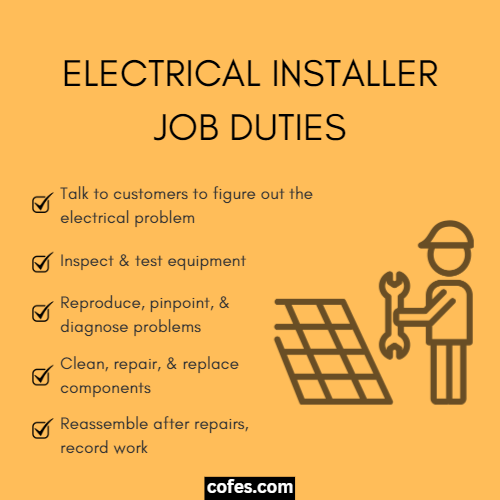The Ultimate Resource for Electrical Installers
If you’re looking for a career that allows you to travel, learn new things, and quickly increase your pay, then becoming an electrical installer may be the right move for you.
While the name may not be exciting, the opportunities available to electrical installers are.
You’ll have a chance to work on complex electrical projects across the country if you want.
If all of that has sparked your interest, then keep reading to get the full scoop on becoming an electrical installer.
Electrical Installer Job Information
| Official Job Title | Electrical Installer |
| Average Salary | $52,759 |
| Stress Level | High |
| Work / Life Balance | Low-Average |
| Job Satisfaction | Average |
| Career Advancement | Average-High |
>>MORE:
Electrical Installer Job Description
What Is An Electrical Installer?
Electrical installers are responsible for installing and repairing a variety of commercial electrical equipment used in various industries.
This equipment will be large-scale and industrial in most cases.
You use specialized tools to install, test, and repair system failures and replace broken components of the electrical equipment.
Most electrical installers will specialize in a specific industry as the equipment they work on is often very complex.
Electrical installers may work at a specific location, such as a factory, to maintain a single company’s electrical equipment.
You may also travel to various locations around the country for a single company or customers to maintain remote electrical equipment.
An example of types of electrical equipment would be transportation navigational equipment, radio transmitters, or wind turbines.
Your skills are required in any complex electrical equipment that is not used by consumers directly.
What Does An Electrical Installer Do On A Daily Basis?
- Install new electrical equipment as needed.
- Perform maintenance on existing electrical equipment.
- Perform safety checks of all components.
- Write reports and certifications for equipment.
- Travel to customer locations to troubleshoot issues

Responsibilities, Duties & Roles Of An Electrical Installer
- Installing and repairing various electrical equipment.
- Service and maintenance of various electrical equipment.
- Monitoring electrical equipment and maintaining and updating records on a daily basis.
- Managing the purchase of new tools, spare parts, and consumables for electrical equipment.
- Communicating issues and integrations with other tradespeople, such as electricians.
- Working on health, safety, and risk programs, including risk assessment of reactive maintenance work tasks.
>>MORE: Wedding Coordinator Job Description: Benefits, Pay, Responsibilities, and More
Electrical Installer Salary
Average Salary
The average salary of an electrical installer is $52,759 per year.
Of course, this would be highly dependent on what industry you’re in and your level of experience and education.
However, if you were being paid less, you should investigate why.
Starting Salary
The starting salary for an electrical installer would be around $44,590 per year.
Senior Salary
As a senior electrical installer, you could earn $67,021 or more per year.
The more complex and specialized your electrical equipment is, the more you could be making.
So one important aspect to consider when you first start is what industry you want to work in.
Make sure it’s in demand and somewhat specialized to ensure higher pay levels when you move up the ranks.
>>MORE: Job Description of a Technical Support Specialist: Tasks, Pay, and Additional Information
How to Become an Electrical Installer
The Entry Level: Certification, Training & Degree
You will need a high school diploma at a minimum.
However, without certification from a technical training college, you will limit what industries you can work in.
If you start your career with an electronics certificate from either a technical school or community college, your opportunities in different industries will significantly increase.
Other Skill Sets, Requirements & Qualifications
Once you become an electrical installer, there are no further requirements, and most training is done on the job.
However, you can be certified with specific equipment, which will gain you further opportunities in your industry and cut down the on-the-job experience you need.
For example, you could attend “Wind School” if you want to work on wind turbines; otherwise, you may need two years of on-the-job training instead.
How Long Does It Take To Become An Electrical Installer?
If you opt to take an electronics course, they often take two years to complete at a community college or trade school.
Some electrical installer jobs only require a high school diploma with everything learned on the job.
However, not all industries or jobs will accept this.
Is It Hard To Become An Electrical Installer?
Being an electrical installer is a technical job.
Therefore, you do require an understanding of electronics and an ability to troubleshoot problems.
The entry requirements are relatively low to the industry, especially if you forego technical training.
However, the less experience and training you have will make it more challenging to gain employment.
>>MORE: Job Description, Pay, Responsibilities, and More for Quality Engineers
Electrical Installer Career Paths
The Electrical Installer Roadmap
The career roadmap for an electrical installer is an interesting one.
Many electrical installers move on to become full electricians, then on to roles as maintenance supervisors, and maintenance directors.
However, the career path can be reversed with many electricians moving towards electrical installer positions.
This is because the starting salary for electrical installers is low, but as you progress and get experience and additional skills, you can make even more money.
So if you wanted to stick with being an electrical installer, your career prospects would be excellent, with pay quickly increasing if you’re willing to switch jobs often.

Projections For Growth In Electrical Installer Jobs
Electrical installer job growth is predicted to increase by -1% through 2031.
This means there will be little or no change in jobs available.
In Summary: Is Electrical Installer A Good Career?
Becoming an electrical installer is a great career move.
Without even leaving the profession, you can quickly increase the money you make.
In addition, the opportunities available are endless due to the different industries you can move into.
With general electrical installer skills and additional industry training, you can move between industries if one becomes boring or saturated with candidates vying for jobs.
>>MORE: Good Job Search Tools (& How They Function)
Electrical Installer Working Conditions
Can An Electrical Installer Work Remotely From Home?
An electrical installer can not work remotely from home.
You are involved in the physical install and repair of large commercial electrical equipment.
You can’t take this equipment home, and you can’t repair anything unless you’re physically on site.
Therefore, you should not expect any remote work.
How Many Hours Does An Electrical Installer Work?
An electrical installer would work a standard 9-5 job, 40-hour week.
However, you may be required to work on-call at certain times to repair equipment that breaks down outside of hours.
You may also need to work different hours if the equipment you repair can not be taken offline at certain times.
Can An Electrical Installer Work Part-Time?
It would be possible to work part-time as an electrical installer.
Whether you take on fewer jobs or only work certain days of the week would be up to you and your employer to decide.
However, there is no specific reason you couldn’t work part-time as an electrical installer.
What Are The Average Vacation Days Of An Electrical Installer?
An electrical installer would not get any special vacation days.
The typical US vacation days would apply to you, which is around ten days per year.
Your vacation days may increase the longer you are with a company, and you would get statutory holidays off.
>>MORE: Job Interview Questions For Candidates
Alternative Careers & Similar Jobs to an Electrical Installer
- Construction Worker
- Surveyor
- Cost Estimator
- Ironworker
- Safety Engineer
- Supervisor
- Heavy Equipment Operator
- Electrical Engineer
- Drafter
- Maintenance Engineer
- Engineering Technician
Electrical Installer Resume Tips
Highlight any electrical experience you have, as well as any experience with electrical equipment, even if it’s not industrial level.
Include any certification you may have or are working towards.
The top skills for electrical installers are the ability to use various tools, being physically strong and capable of lifting heavy objects, and excellent troubleshooting skills.
>>MORE: Top Paying/Least Stress Personal Shopper Jobs
Electrical Installer Interview Questions
When being interviewed for an electrical installer position, understanding the types of questions you will be asked is helpful.
Review some of the questions below so you can be better prepared.
Q1: Have you ever built any kind of electrical system yourself?
Why it works: If this is your first electrical installer position, they want to know if you’d had a prior interest in this type of work.
It could even be as simple as building your own computer from parts.
Showing that you’ve put electrical systems together before is the key answer they want.
Q2: Discuss a time you had to troubleshoot a problem with something electrical.
Why it works: Everybody has to deal with electrical issues in their lives.
Whether your car fails to start, your computer won’t boot, or your lights won’t turn on.
The interview question is designed to find out how you troubleshoot electrical problems.
If you just call somebody else, then you may not be an ideal candidate.
Jobs Related to Electrical Installers
- Electrician
- Line worker
- Electrical technical
- Power plant operator
>>MORE: Highest Paying/Least Stressful Product Testing Jobs
For HR Managers: Tips for Hiring an Electrical Installer
Key Characteristics To Look For In An Electrical Installer
Key characteristics to look for in an electrical installer would be:
- Must have a keen ability to identify colors. This is due to the color-coding of wires in electrical equipment.
- Excellent communication skills.
- Physical strength when dealing with large replacement parts.
- Great troubleshooting skills. A significant part of the job would be diagnosing and repairing problems.
Minimum Level Of Education & Experience
When looking for a new electrical installer, the minimal experience would be a high school diploma.
However, that would then require on-the-job training.
Suppose you want an electrical installer to hit the ground running.
In that case, they should have completed an electronics certificate at a technical college or community college.
